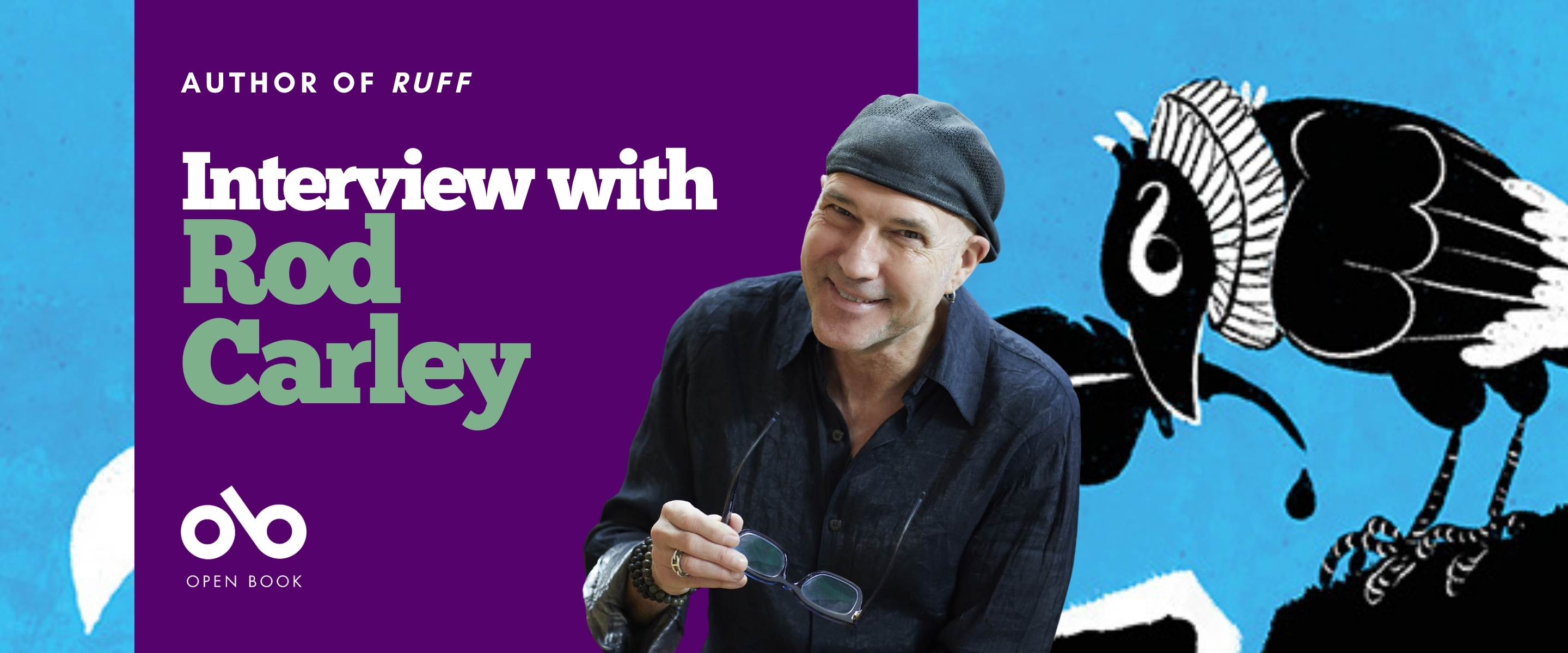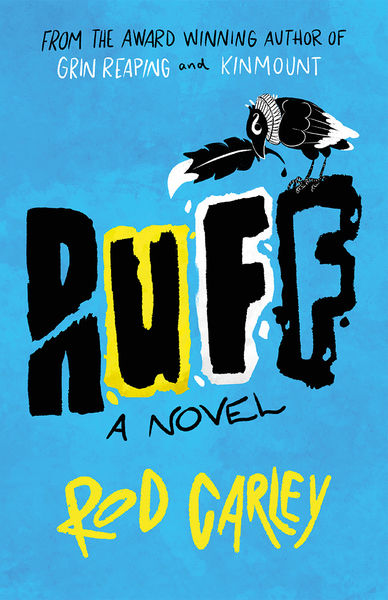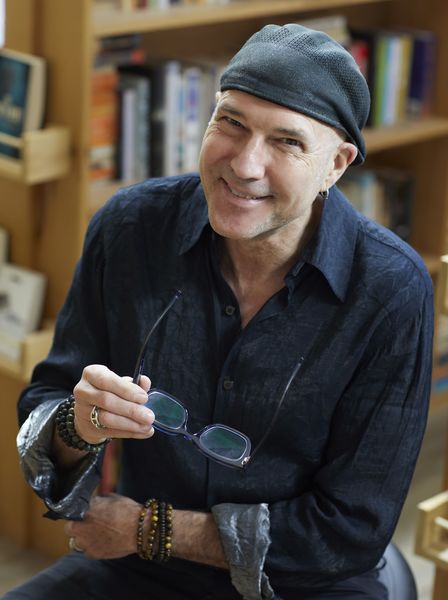Rod Carley's Latest Novel is a Theatrical Odyssey Full of Elizabethan Eccentrics
With trademark humour and vivid imagination, Rod Carley is back at it in his latest novel, a Shakespearean romp set in 17th century Stratford-upon-Avon, and in Scotland (and all the roads between). Ye good readers can prepare yourselves for a theatrical odyssey full of Elizabethan eccentrics that jump off the page.
In RuFF (Latitude 46 Publishing), we join Will Shakespeare during a very bad year in which plagues, the death of a monarch, and other personal crises are laying the artist low. Still, he must overcome all of this when the new King announces a national play competition that may well determine the future of Shakespeare's company. Misfits, activists, poets, and punks all descend on the story as Will tries to complete a Scottish supernatural thriller.
It's a wonderful mix of history, humour, and satire that will have readers enrapt, and, amazingly, the novel is "Ruffly based on a true story."
The author tells us much more about RuFF in this Long Story Novelist Interview, presented here for all of our fair readers.
Open Book:
Do you remember how your first started this novel or the very first bit of writing you did for it?
Rod Carley:
Dave Middleton, the protagonist of my second novel KINMOUNT, is a descendant of playwright Thomas Middleton who matched Shakespeare on his own ground. The notion of writing a novel about how the pair came to work together appealed to me. After six months of research followed by another four months of outlining, I started experimenting with finding young Will’s voice in the opening flashback chapter. I wanted to shorten the gap between Shakespeare’s world and ours. It was crucial that the novel be fresh and relatable to the modern reader. And it started with the characterization of Will:
Buc was staring at Will wondering how the balding, paunchy middle-aged man sitting beside him could be the author of Hamlet. He looked average—average like a used cart salesman, average like a chimneysweep, average like a pig farmer—not the Lord Chamberlain’s chief poet.
- p. 21, Part One, Chapter 2, RUFF
OB:
How did you choose the setting of your novel? What connection, if any, did you have to the setting when you began writing?
Your CanLit News
Subscribe to Open Book’s newsletter to get local book events, literary content, writing tips, and more in your inbox
RC:
The setting of the novel is the early seventeenth-century in London, Stratford-upon-Avon, and Scotland (and the roads that connect them) during the Little Ice Age, a period of abnormally cold temperatures. I chose the setting because I had to be historically accurate, give or take a road wash-out. This period’s setting is also familiar to me due to the many Shakespeare productions I have directed.
OB:
Did you find yourself having a "favourite" amongst your characters? If so, who was it and why?
RC:
I created a character named Shuttlecock that appears in one chapter. He’s a doddering, old lawyer whose clients are vermin, literally – pigs, rats, dolphins, flies. Medieval animal lawyers did exist. I amused myself writing his cameo. If I must choose an overall favourite character, it’s Maggie Marbecke, the activist wife of Thomas Middleton who is fighting for a woman’s right to tread the boards. She’s more modern than tomorrow.
OB:
If you had to describe your book in one sentence, what would you say?
RC:
RUFF is a timeless yet timely historical fiction in which Will Shakespeare faces one ruff and puffy obstacle after another while struggling to write a Scottish supernatural thriller for the new king to survive.
OB:
Did you do any specific research for this novel? Tell us a bit about that process.
RC:
Countless scholars have combed through Elizabethan England’s parish and court records looking for traces of William Shakespeare. Despite the volumes of books on Shakespeare that fill libraries around the globe, we know very little about the man himself. What we know for sure, would barely fill a slender monograph. About twelve first-hand sources exist – Shakespeare’s christening, a marriage certificate, a death certificate, his children’s birth and baptismal records, and a few court records. And that’s it. American author William Styron once wrote that the historical novelist works best when short on rations. The rations at my disposal were scant but tasty, just the kind of morsels to nourish an empathetic comic imagination. I have a long working relationship with Shakespeare as a director, teacher, adaptor, and actor. I’ve researched many aspects of Elizabethan theatrical practice, society, and history. For RUFF, I needed to understand the ins and outs of each character’s everyday life, plague protocols, Renaissance medicine, James I and his obsession with the demonology, and climate change. I spent a great deal of time going down the rabbit hole of Elizabethan fake news! In the novel, Will’s three-legged beagle, Biscuit, gets more accurate news sniffing another dog’s butt than a Londoner does listening to the news.
OB:
What was the strangest or most memorable moment or experience during the writing process for you?
RC:
The most memorable experience during the writing process was discovering the clear parallels between Shakespeare’s world and ours today. RUFF was born during the pandemic-fueled sourdough frenzy. A meme made the rounds claiming Shakespeare made use of being quarantined to write King Lear. Pestilence was rife in his time, closing theatres and ravaging life. He also faced a runaway climate crisis. The Little Ice Age was an interval of erratic cooling that ravaged the Northern Hemisphere between the fourteenth and nineteenth centuries. While we sweat due to global warming, early modern Europeans froze. Across the border, abortion-obsessed evangelical Christian Republicans are more concerned with forcing people to have children than making it easier to look after them. Shakespeare had to deal with the Puritans. The Puritans disapproved of many things in Elizabethan society, but they hated the theatre the most. Elizabeth I reigned for 45 years. After her death, despite the plague lockdown, the new King, James I, was met on the road to Windsor by thousands who found it a curious experience to be waiting to greet the King, since no one under fifty could remember a time when there had been a man on the throne of England. Sounds familiar. Puritan polemicists expressed themselves in diatribes against transvestite boy actors and cross-dressing teenagers. All of which makes Shakespeare’s writing truly remarkable with his glorious demonstrations of the range of gender possibilities to early seventeenth-century Londoners, no matter the story beneath the petticoat or hose. North of London the homeless pitched tents refurbished from old sails they found discarded in the shipyard. Stir in the burgeoning punk scene, government censorship, the Scottish witch burning craze, fake news, xenophobia, plus the fight for equality, and the modern resonances are striking.
OB:
Did you include an epigraph in your book? If so, how did you choose it and how does it relate to the narrative?
The epitaph for RUFF is by the punk band The Clash:
London Calling, yes, I was there, too,
And you know what they said? Well, some of it was true.
I chose the lyrics because they reflect both the cheekiness and modern edge of the novel. I’ve created an early Jacobean punk scene comprised of young poets, actors, and musicians -- Tommy Middleton in particular -- who view Shakespeare as yesterday’s news. Tommy hates conformity with all the passion of his free ranging intellect and feels an actual sense of suffocation under the series of tight religious rules the average Englishman takes for granted. The pendulum of literary fashion usually swings violently once it begins. The disillusioned young moderns of the new century in RUFF turn their backs on their elders under the impression that they have made a completely new discovery about the world they live in, signalling a new brand of writers – rebellious and aggressive young men who’ve fallen from their upper-class stations.
In the novel, The Hautboys are an up-and-coming London punk band, famous for their sour notes and setting their lutes on fire.
“Punk” is a notoriously slippery term, unstable, ambiguous, flashy and transgressive. It’s a youthful and working-class word – banned from polite circles – and, in the novel, it is freshly ubiquitous. For Maggie, it sums up the thread that connects everything she stands for – equity and equality.
______________________________________________
Rod Carley is the award-winning author of three previous works of literary fiction: GRIN REAPING (long listed for the 2023 Leacock Medal for Humour, 2022 Bronze Winner for Humour from Foreword Review INDIES, a Finalist for the 2023 Next Generation Indie Book Award for Humor/Comedy, and long listed for the ReLit Group Awards for Best Short Fiction of 2023); KINMOUNT (long listed for the 2021 Leacock Medal for Humour and Winner of the 2021 Silver Medal for Best Regional Fiction from the Independent Publishers Book Awards); A Matter of Will (Finalist for the 2018 Northern Lit Award for Fiction). His short stories and creative non-fiction have appeared in a variety of Canadian literary magazines including Broadview (winner of the 2022 Award of Excellence for Best Seasonal Article from the Associated Church Press), Cloud Lake Literary, Blank Spaces, Exile, HighGrader, and the anthology 150 Years Up North and More. He was a finalist for the 2021 Carter V. Cooper Short Fiction Prize. Rod was the 2009 winner of TVO’s Big Ideas/Best Lecturer Competition for his lecture entitled “Adapting Shakespeare within a Modern Canadian Context. He is a proud alumnus of the Humber School for Writers and is represented by Carolyn Forde, Senior Literary Agent with The Transatlantic Agency.







